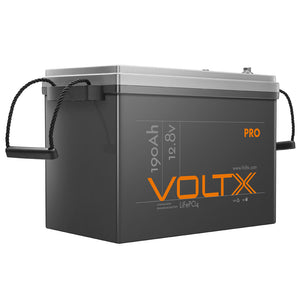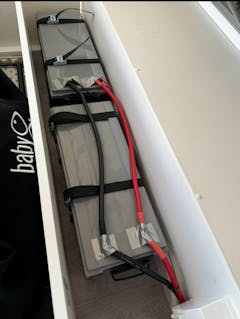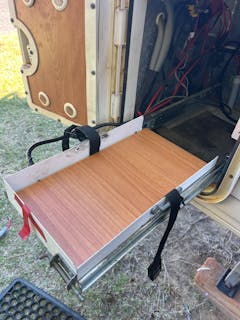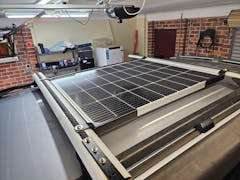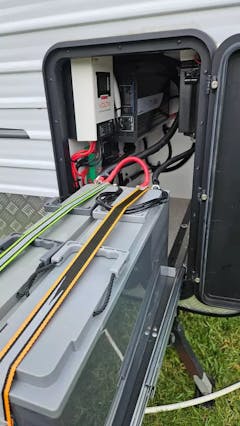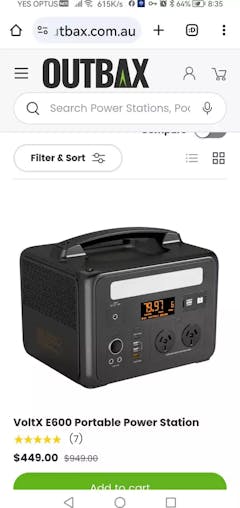VoltX 12V 190Ah Pro Lithium LiFePO4 Battery
Was$1,049.00Now $839.20Unit price /UnavailableLow stock
Welcome to the world of reliable, lightweight power solutions. A 190Ah lithium battery represents a significant advancement in off-grid power technology, offering remarkable advantages over traditional battery types. These high-capacity 12V 190Ah LiFePO4 battery units have revolutionised how adventurers, caravaners, and marine enthusiasts approach their energy needs.
Understanding the sophisticated technology behind these lithium batteries unlocks their full potential for your setup, whether you're powering a remote campsite, integrating with solar panels, or ensuring reliable marine electronics. With their exceptional performance characteristics and longevity, these LiFePO4 batteries have become the gold standard for anyone seeking dependable energy storage solutions across Australia's diverse landscapes.
Understanding Lithium Iron Phosphate Technology
What is LiFePO4 Battery Technology
At its core, a LiFePO4 battery utilises lithium iron phosphate as its cathode material, creating one of the safest and most stable lithium chemistries available today. This lithium LiFePO4 battery technology differs fundamentally from other lithium variants by offering superior thermal stability and inherent safety features that make it ideal for deep cycle applications. When asking what are LiFePO4 batteries, it's essential to understand that this chemistry provides consistent voltage output throughout its discharge cycle, unlike traditional lead-acid alternatives that experience significant voltage drops. The LiFePO4 technology excels in applications requiring sustained power delivery, making these electric battery solutions particularly suited for demanding Australian conditions where reliability is paramount.
Key Advantages of LiFePO4
The practical benefits of choosing the best lithium battery technology extend far beyond mere specifications. Lightweight Lithium Batteries typically weigh 60-70% less than equivalent lead-acid batteries, transforming installation and handling requirements whilst delivering superior lithium battery power. These advanced power batteries offer thousands of charge cycles compared to hundreds for traditional alternatives, translating to exceptional long-term value. The faster charging capability means less downtime, whilst the higher usable capacity ensures more consistent battery power delivery throughout the discharge cycle. Additionally, the remarkably low self-discharge rate makes these battery solutions ideal for seasonal use, maintaining their charge even after months of storage.
Features of a 190Ah 12V Lithium Battery
Capacity and Voltage Explained
Understanding what a 190Ah Battery offers requires grasping the practical implications of its specifications. The 190 amp-hour rating indicates this 12V LiFePO4 Battery can theoretically deliver 190 amps for one hour, or more realistically, 9.5 amps continuously for 20 hours. This 190Ah LiFePO4 Battery capacity sits perfectly between the common 100Ah lithium battery and 200Ah lithium battery options, providing an ideal balance for many applications. The standard 12V battery configuration ensures compatibility with existing systems, whilst the LiFePO4 chemistry maintains voltage stability far better than traditional alternatives. When taking capacity into consideration, a 190Ah unit at 12V provides approximately 2.28kWh of usable energy, making it a substantial power source for various applications.
Lightweight Design Benefits
The revolutionary weight reduction of a lightweight lithium battery transforms installation possibilities and vehicle dynamics. For lithium camping battery applications, the reduced weight means easier handling during setup and more capacity for other essential gear. Lithium RV battery users particularly benefit from improved fuel efficiency and handling characteristics, whilst lithium boat batteries installations result in better vessel performance and stability. The lightweight nature opens up flexible mounting options previously impossible with heavy lead-acid alternatives, allowing creative solutions for space-constrained installations.
Parallel Connection Capability
Expanding capacity through parallel lithium battery configurations offers remarkable flexibility for growing power needs. Most quality units allow connection of up to four batteries in parallel, effectively quadrupling available capacity whilst maintaining the 12V system voltage. This scalability means starting with a single unit and expanding battery banks as requirements grow, creating efficient dual battery systems or larger installations. The integrated battery management System ensures balanced charging and discharging across connected units, maintaining optimal performance and longevity.
Ideal Uses and Applications of 190Ah Batteries
Powering Your Camping Adventures
A quality 190Ah camping battery transforms the outdoor experience by reliably powering essential equipment throughout extended trips. From running efficient 12V fridges to LED lighting systems and water pumps, this lithium camping battery ensures comfort without compromise. If you’re using a lithium deep cycle battery in particular, it excels in remote locations where reliability is crucial, providing consistent power for device charging, communications equipment, and camp lighting. The lightweight design simplifies packing and setup, whilst the deep discharge capability means maximising usable capacity without damaging the battery.
Reliable Energy for Caravans and RVs
Modern caravanning demands robust power solutions, and a 190Ah lithium RV battery delivers exceptional performance for extended off-grid adventures. It effortlessly powers multiple appliances simultaneously, from air conditioning systems (via appropriate inverters) to entertainment centres and kitchen equipment. The space and weight savings compared to a traditional deep cycle battery in Australia means more room for essentials and improved towing dynamics, whilst the rapid recharge capability minimises generator runtime at powered sites.
Marine and Boat Battery Solutions
Maritime applications demand exceptional reliability, and 190Ah lithium marine batteries excel in harsh marine environments. Whether powering sensitive navigation electronics, running lithium trolling motor battery systems for extended fishing sessions, or ensuring cabin comfort, these lithium boat batteries provide stable, clean power essential for modern vessels. The corrosion-resistant construction and vibration tolerance make marine lithium batteries ideal for Australian coastal conditions, whilst the consistent voltage output protects sensitive electronics from damage.
Integrating with Solar Systems
190 lithium batteries are an excellent fit for solar power setups, offering high capacity and efficient energy storage for both residential and mobile applications. LiFePO4 chemistry pairs exceptionally well with solar charge controllers, accepting charge efficiently whilst minimising losses. These lithium batteries for solar panels store daytime generation for evening use, creating truly independent power systems. Whether opting for lithium batteries for solar system installations or upgrading existing solar system batteries, the high charge acceptance and deep discharge capability of a 190Ah LiFePO4 battery optimise any system’s performance.
Choosing the Right Lithium Battery
Comparing Capacities
Selecting between a 100Ah lithium battery, 120Ah lithium battery, or 200Ah lithium battery depends on specific power requirements and usage patterns. The 190Ah capacity provides an excellent middle ground, offering substantial power without the bulk of larger units. For comparison, LiFePO4 100Ah suits weekend camping trips, whilst LiFePO4 200Ah better serves full-time living applications. Understanding daily power consumption helps determine whether 190Ah meets your needs or if scaling up provides necessary reserves.
What to Look for in a Quality Battery
Identifying the best lithium battery requires evaluating multiple factors beyond capacity alone. Quality battery management systems protect against overcharge, over-discharge, and temperature extremes, ensuring safe operation and longevity. When researching the best LiFePO4 manufacturers, consider cycle life ratings exceeding 3000 cycles, operating temperature ranges suitable for Australian conditions, and relevant safety certifications. Manufacturer reputation, local support availability, and comprehensive lithium battery warranty terms indicate long-term reliability and value.
Getting Started with Your New Battery
Maximising your investment requires proper installation and charging practices using an appropriate lithium battery charger designed for a 190Ah LiFePO4 battery. Quality battery chargers for lithium batteries ensure optimal charging profiles, extending battery life whilst maintaining peak performance. When determining what size charger for 190Ah battery equivalents, consider charging time requirements and available power sources.
Pairing with an inverter with a lithium battery also creates versatile AC power systems, whilst battery inverter generator combinations provide backup charging options. Checking physical dimensions and terminal configurations ensures smooth installation, whilst understanding BMS features helps monitor system health. The exceptional benefits of quality LiFePO4 technology justify the initial investment through years of reliable service.
Frequently Asked Questions
- What is the usable capacity of a 190Ah LiFePO4 battery?
Unlike lead-acid batteries limited to 50% discharge, LiFePO4 batteries safely provide 80-100% of rated capacity. A 190Ah unit delivers approximately 152-190Ah of usable power, depending on discharge rates and BMS settings.
- How long will a 190Ah 12V battery last running a typical camping fridge?
A quality 12V camping fridge consuming 40-60Ah daily would run 3-4 days on a single 190Ah battery, assuming 80% usable capacity and no solar input. Actual runtime varies with ambient temperature and fridge efficiency.
- What size inverter do I need for a 190Ah battery?
Inverter sizing depends on intended loads rather than battery capacity. A 190Ah battery can support inverters from 300W to 2000W, though larger inverters require careful consideration of discharge rates and cable sizing.
- How long does it take to charge a 190Ah battery using a 30A charger?
Charging from 20% to 100% typically takes 8-10 hours with a quality 30A LiFePO4 charger. Solar charging times vary with panel size and conditions, whilst generator charging offers consistent results.
- Can I connect two 190Ah batteries together to get 380Ah?
Yes, connecting batteries in parallel doubles capacity whilst maintaining 12V. Ensure identical battery models and charge states before connection, and verify your BMS supports parallel operation.
- Is a 190Ah LiFePO4 battery safe to use inside a vehicle or caravan?
Absolutely. LiFePO4 chemistry is inherently safe with minimal gas emission, making indoor installation perfectly suitable. The integrated BMS provides additional protection against fault conditions.
- What is the expected lifespan or cycle life of a 190Ah LiFePO4 battery?
Quality units typically offer 3000-5000 cycles at 80% depth of discharge, translating to 8-13 years of daily use. Moderate usage patterns can extend lifespan beyond 15 years.
- Do I need a special charger for a LiFePO4 battery?
Yes, LiFePO4 batteries require chargers with appropriate voltage profiles (14.4-14.6V absorption). Using incorrect chargers risks undercharging or damaging the BMS.
- What is the warranty period for this battery?
Premium 190Ah LiFePO4 batteries typically include 5-year warranties covering manufacturing defects. Extended warranties may be available from quality manufacturers.
- How much does a 190Ah lithium battery weigh?
Most 190Ah LiFePO4 batteries weigh 20-25kg, compared to 55-60kg for equivalent AGM batteries, representing 60-70% weight reduction.
- What are the benefits of the Battery Management System (BMS)?
The BMS protects against overcharge, over-discharge, short circuits, and temperature extremes whilst balancing cell voltages. This critical component ensures safe operation and maximises battery lifespan.
- Can this battery be used in cold weather?
LiFePO4 batteries operate effectively down to -20°C for discharge, though charging below 0°C requires batteries with integrated heating or temperature compensation. Most quality units include low-temperature charging protection.
Frequently Asked Questions
- What are the main advantages of a lithium battery over older types?
- How do I choose the right size or capacity (Ah) for my lithium battery?
- Are lithium batteries good for camping and caravans in Australia?
- What does BMS mean in a lithium battery?
- How long does a LiFePO4 lithium battery typically last?
- Can I use any charger for my LiFePO4 lithium battery?
- Are lithium batteries safe to use?
- What is a slimline lithium battery useful for?
- What are the benefits of a lithium battery with Bluetooth?
- What makes a 12V lithium battery a popular choice?
